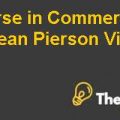Introduction:
This case study is mainly dealing with a Spanish Company Repsol which was a nationalized company in the start and it was privatized after 10 years of business operations. It is discussed in the case about the investment strategies used by Repsol for investing in YPF which is Argentine based oil company. This leads to two transaction offers which consist of the first offer to purchase a shareholding of around 14.99% at $38 per share and other option was to purchase around 85% shareholding at a premium plus share price of $44.78.
This resulted in the takeover of YPF Company by Repsol as it had the shareholding of more than 50% which means the company had the control over the operations. The new company was formed by going through the diversification in the Oil and Exploration business. In Spain, there is a trend to consider Oil and gas not just a commodity but as a natural resource which is governed and regulated by the Government. So, this is given more consideration which leads to the conflicts between government bodies and companies who are dealing in Oil and Gas as seller wants to maximize his profits whereas government demands a regulated price to be charged for these products.
These type of products consist of the strict regulations of government which result in the price ceiling and price floor as per the requirements and it has also resulted in the nationalization of many companies due to high regulations and utilizing these resources for the best interest of thepublic by taking over the property from its owner. This needs a close examination of the situation going on after the amalgamation of YPF with Repsol and the improvement in financial position as well as economic conditions of both the economies which lead to the synergy and better performance for Repsol and YPF through utilization of expertise in Oil and Petroleum product.
Repsol and YPF- a perfect marriage (A) Harvard Case Solution & Analysis
Problem Statement:
How can the Repsol exercise Corporate Diplomacy strategy to regain its stakeholders’ confidence and keep its investment intact in YPF rather than making it nationalized?
Corporate Diplomacy:
It means the expertise, abilities, and skills of the top management to perform the role of mediator by maintaining the strong and effective communication and relationship building with its external stakeholders which consist of government regulatory bodies, legal authorities, customers, suppliers, business partners etc. It also needs to be evaluated whether the company is able to deliver the maximum value to its stakeholders or not with its current operations and strategies.
Corporate Diplomacy strategy:
The strategy which could have been used by Repsol-YPF was through the de-nationalization of this company and running its operations without the interference of government on pricing. However, in nationalized companies, the prices are regulated by governments whereas for corporate diplomatic organizations which have been given the laissez faire authority and responsibility to work for the betterment of public and consumers. This will lead toprovidingthe better health and education facilities to the less privileged people of society.......
This is just a sample partical work. Please place the order on the website to get your own originally done case solution.










